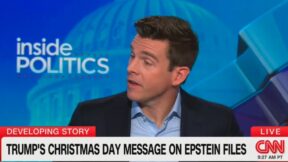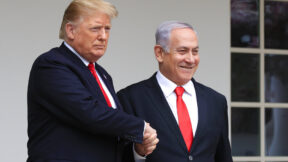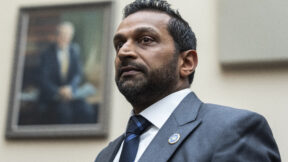Fox Weather Meteorologist Steve Bender Speaks to Mediaite About New Channel: We Won’t ‘Debate Climate Change, We Will Report On It’

Fox News Media’s latest news venture, Fox Weather, is up and running and already hit more than 1 million downloads in its first week.
The free service, which is positioning itself to compete with the likes of the Weather Channel, was launched by Suzanne Scott, Fox News Media CEO, who hired Sharri Berg, the former chief operating officer of news and operations for Fox Television Stations, to be its first president.
With climate change and an onslaught of extreme weather stories driving news cycles much of the summer and fall, the new channel has much to cover, and has already hired over 40 dedicated meteorologists with stations all over the country. The service offers what Fox is hyping as “trailblazing features” like 3D mobile radar and live 24/7 streaming.
To get further insight into the early success of Fox Weather, how it plans on tackling the partisan debate surrounding climate change, the sensationalizing of weather for clicks, and the increase in extreme weather, Mediaite spoke to Fox Weather meteorologist Steve Bender about what we can expect from the service.
Bender is a Fox Weather field correspondent based in Miami, who recently traveled to Glasgow, Scotland to report on the 2021 United Nations Climate Change Conference, COP26.
Mediaite: Tell me a bit about the new launch and what’s the gap that Fox Weather hopes to fill that’s not already taken by other outlets like the Weather Channel? Are there any of Fox Weather’s exclusive features you are particularly excited for the reader to use?
Steve Bender: The FOX Weather launch has been successful and I’m looking forward to our growth. The first week of FOX Weather there were bomb cyclones, tornados, severe thunderstorms, major temperature swings, etc. and so we had plenty of content to talk about. What separates us from our competitors is not just covering these weather stories as meteorologists, but connecting with the audience and those who are impacted by these events. We have a dedicated field team that travels the entire country for live coverage and if you haven’t already, I would encourage you to watch Robert Ray’s piece of Lake Charles cleaning up after an EF-2 tornado. It was a 5 or 6-minute interview, more like a conversation, that nearly brought you to tears because you’re seeing and hearing the raw emotion after a severe weather event. There is no other platform that is going to do that. Also, our app has a 3D radar capability that isn’t offered by any other free app. This feature allows you to track the strongest part of these storms alongside us in-studio. Finally, our app also has a plan tab that I’ve used for my vacations, business trips, and even for COP26 to help you prepare ahead of time.
I understand you just came back from Glasgow and the COP26 climate conference, how was that as an overall experience, and what do you think were the big deliverables from the conference?
This was my first ever UN Climate Conference and I have to say overall it was a great experience. My team and I covered COP26 from Scotland and to see that many people, not just countries and governments, but people show interest in climate change was inspiring. There is still one week left of the conference and some tough negotiations ahead, but I would say the biggest deliverable was the movement towards keeping the Paris Agreement. The World Meteorological Organization put out a new climate report at the start of COP26 to illustrate how more action needs to be taken and that at the current rate we won’t be close to keeping 1.5 degrees Celsius within reach. Throughout the first week of the conference, we saw developed nations fall short on their initial financial goal of giving 100 billion annually to help developing countries with climate change, but now will be able to deliver that in 2023. Also, over 40 countries pledged to quit coal by 2040 with some separate agreements to end public financing of unabated fossil fuel projects.
I see on the website a section for “extreme weather,” do you believe this is the major trend impacting weather reporting today? Do you see this trend accelerating and why?
I see this as a trend, and for FOX Weather, it is used to document severe or historical weather events that lie outside the average. The heatwave in the Pacific Northwest, the ice storm last winter, the Dixie wildfire, the flooding from Hurricane Ida, the tornados in October, etc. alone these don’t seem too significant, but when you realize this, all happened in 2021 then the word extreme doesn’t seem that… extreme. As a meteorologist, I do worry about this trend accelerating in the future to get attention on social media. Ask any meteorologists that have worked in an area that has winter storms and the misery that comes with snow models. There are people, stations, and media outlets that will sensationalize snow models or even use outdated estimates just to get clicks. That part of the “extreme” weather reporting does worry me because it’s not helpful and in some cases is harmful.
Having been in New York City this fall and experiencing deadly storm after storm, and I understand you are in Miami, do you see a new or changed importance in weather reporting?
After traveling to cover severe weather, I would say there is new importance to weather reporting because of social media. We have talked about the severe weather in 2021 alone and how many people and families were impacted by these events. It comes back to the point I made earlier about extreme weather. There will be those who will put out unreliable content and will put anything online to get attention, but then you’ll have meteorologists whose goal is to give you accurate information to keep you safe and connect you with those who are being affected in real-time.
Fox Weather is obviously going to be tied to the Fox brand by many viewers and its big stars who have been critical of climate change. What impact do you think that will or will not have on the channel?
FOX created this new platform because there is a need for it. We have brought in meteorologists from all over the country with experience and specialties in every type of weather. And within hours of launch, FOX Weather was the number one free app in the IOS store and by the end of the week, there were over one million downloads. We understand the scrutiny, but point to the fact we are a news platform and not a place where we will debate climate change, we will report on it. We have demonstrated that in the first two weeks since launch, including during my coverage in Scotland and I look forward to the opportunity to show off our expertise as meteorologists across FOX Weather.
When looking at the climate change debate in the U.S. and its partisan divisions, what is your responsibility as a weather journalist? And how do you, if at all, work to ensure scientific and expert research and analysis reaches your audience?
My responsibility as a meteorologist is to give an accurate forecast and pass along scientific research from credible organizations. Everything has become politicized in the U.S. and that’s why we have different media outlets that cover strictly politics. I don’t worry about what one party says or what one party promises because in the end weather doesn’t choose aside. A wildfire or tornado or hurricane doesn’t care if you’re a Democrat or Republican and neither do I. My job is to analyze the computer models (which aren’t party biased) and then use my experience to give you the most accurate forecast that I can deliver.





Comments
↓ Scroll down for comments ↓